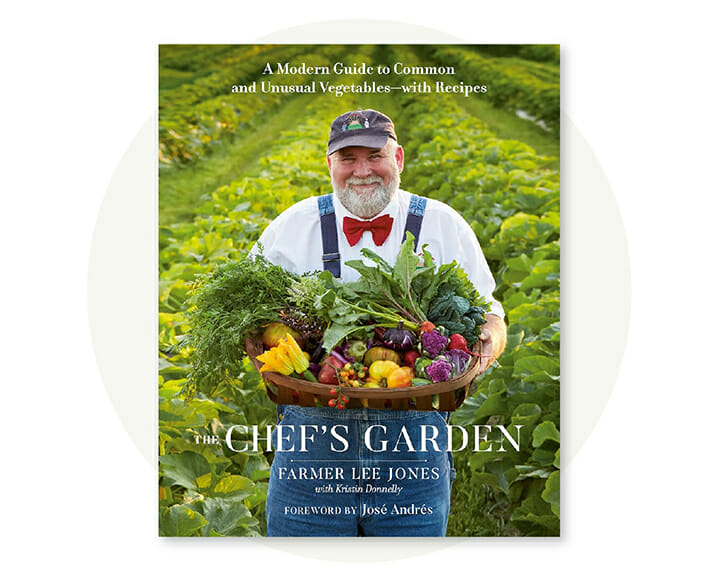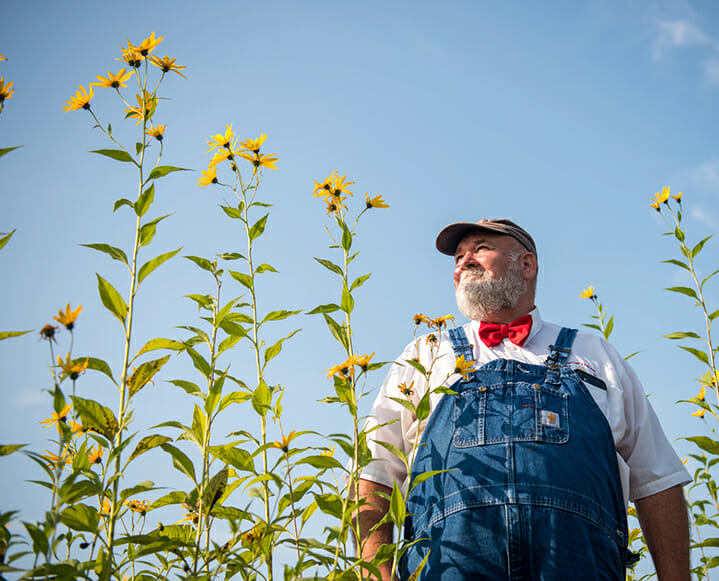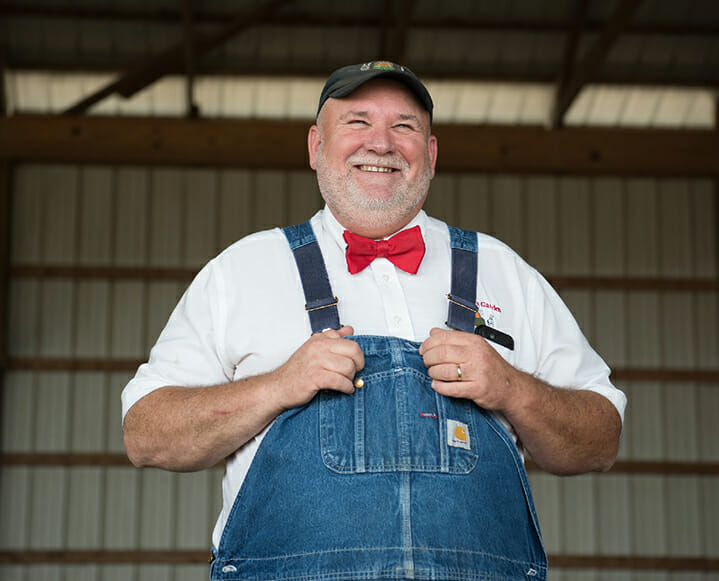Whether you frequent your local farmers’ market or shop for produce at your local grocery story, getting to know the story behind those fresh figs or understanding the source and seasonality of those heirloom tomatoes helps us to create a healthier connection to our food and those who cultivate it. Regenerative agriculture expert and farmer Lee Jones is on a mission to help not only consumers, but top chefs, around the world make mindful food choices that support local and sustainable farming practices.
You may already be familiar with this farming legend or his signature red bow tie and overalls: he was the first farmer to be a judge on Iron Chef, one of the first farmers to receive a James Beard Foundation award, and his wisdom has been featured just about everywhere from the New York Times to The Martha Stewart Show. Jones’ new cookbook The Chef’s Garden has quickly become the go-to bible for home cooks and top chefs.

We asked him to summarize his top advice for anyone looking to improve their own produce selection and culinary expertise.
10 Things Farmer Lee Jones Wishes Everyone Knew About Food + Farm
01 Embrace the Seasons | Nature’s bounty varies with the seasons, offering a rich tapestry of flavors and nutrients. By embracing what each season brings, you not only indulge in the freshest produce but also support sustainable agricultural practices. Our farm, for instance, takes pride in growing an array of seasonal vegetables, each with its unique character and taste.
02 Support Local Farmers | Visiting farmers’ markets and purchasing directly from local growers like myself strengthens the community’s agricultural heritage. It allows you to connect with the people who cultivate your food and fosters a transparent food chain. When you buy from local farmers, you support small-scale, family-run operations, which in turn, aids in sustaining a vibrant and diverse farming landscape.
03 Reduce Food Waste | As a farmer, I understand the significance of reducing food waste. By embracing “imperfect” produce and creatively utilizing all parts of the plant in recipes, such as making carrot top pesto, we can make a meaningful difference in minimizing waste and ensuring more nutritious food reaches our tables. Each vegetable’s uniqueness adds to its appeal and contributes to a positive impact on food sustainability.
04 Value Soil Health | Regenerative farming is at the heart of our practices here at the farm. We prioritize soil health by using cover cropping, reduced tillage, and organic matter incorporation. By nurturing the soil, we create a thriving ecosystem that supports not only the growth of vegetables but also the wellbeing of beneficial organisms.
05 Compost and Reduce Waste | Composting is a fundamental aspect of our farming philosophy. We recycle organic plant waste, transforming it into nutrient-rich compost that enriches the soil and supports our crops. By reducing waste through composting, we contribute to the circular nature of our farm’s ecosystem.
06 Know Your Food Labels | Being aware of food labels allows you to make informed choices aligned with your values. While our farm is not certified organic, we adhere to regenerative farming principles that go beyond conventional practices to prioritize environmental health and sustainability.
07 Preserve Food Properly | Properly storing vegetables and fruits is essential to retain their freshness and nutrients. As a farmer, I recommend learning the best storage methods for different produce to extend their shelf life and minimize food spoilage.
08 Diversify Your Diet | A diverse diet not only introduces you to a multitude of flavors but also supports biodiversity. At our farm, we grow an array of heirloom and specialty vegetables, encouraging culinary exploration and a deeper connection to the land.
09 Choose Sustainable Farming | Opting for vegetables grown through regenerative farming practices ensures that you are contributing to environmental restoration and conservation efforts. Regenerative farming helps sequester carbon, rebuild soil health, and restore ecosystems.
10 Be A Mindful Consumer | Being mindful about your food choices means recognizing the impact they have on your health, the environment, and farming communities. By supporting regenerative farming and local growers, you become an active participant in creating a sustainable and resilient food system that benefits us all. Your choices matter, and together, we can cultivate a healthier future for generations to come.













